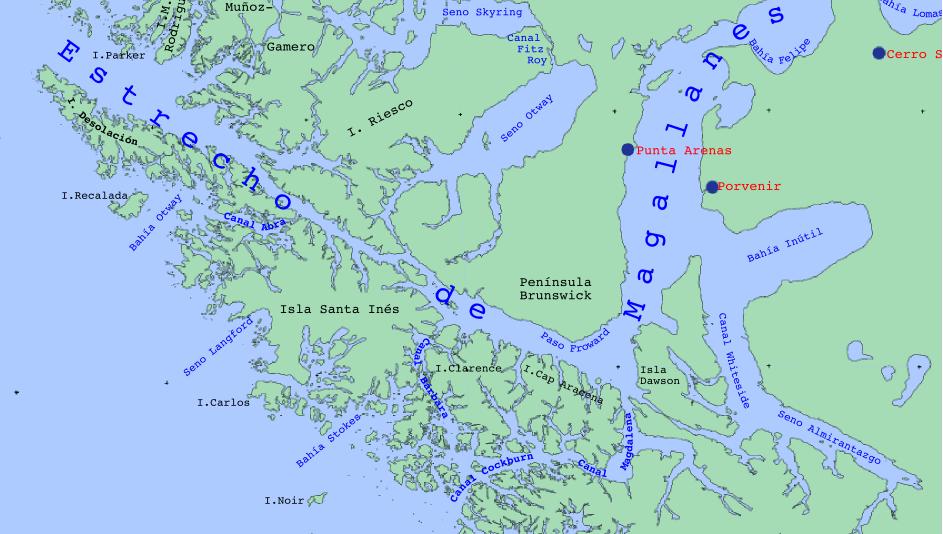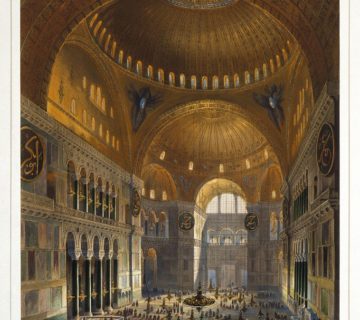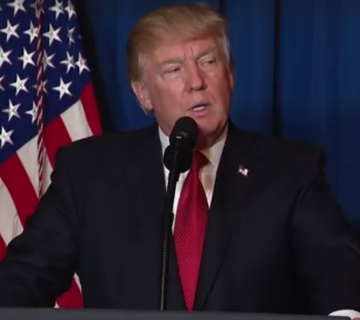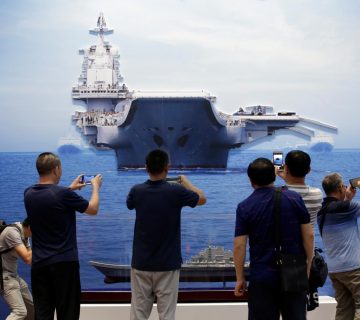http://en.wikipedia.org/wiki/Image:Chile.estrechodemagallanes.png, CC BY-SA 3.0, https://commons.wikimedia.org/w/index.php?curid=4314451
By George Dimitrakopoulos
 Freedom of navigation in the high seas has always been an important principle defended by the United States ever since The declaration Of Independence and later the adoption of the American Constitution to his date . Many are the instances in the history of the United States where the President or the US Congress, the former making declarations,the latter adopting legislation in the defense of this principle also known as the “ Free Ships Free Goods” principle particularly during wartime when the United States had opted to maintain a neutral position . It is interesting to note the adoption by the United States Congress of the Naval Act of 1794, following encouragement by New England merchants who had suffered losses during their maritime trading activities. The Act called for the reestablishment of the US Navy and the construction of frigates with a view to defend American interests in the Mediterranean. It is equally interesting to underline the fact that the defense of the freedom of navigation principle was one of the fourteen points President Wilson proposed to the US Congress during the first World War. In his relevant address he mentioned the importance of preserving freedom of navigation outside the territorial waters, “…alike in peace and war…”.
Freedom of navigation in the high seas has always been an important principle defended by the United States ever since The declaration Of Independence and later the adoption of the American Constitution to his date . Many are the instances in the history of the United States where the President or the US Congress, the former making declarations,the latter adopting legislation in the defense of this principle also known as the “ Free Ships Free Goods” principle particularly during wartime when the United States had opted to maintain a neutral position . It is interesting to note the adoption by the United States Congress of the Naval Act of 1794, following encouragement by New England merchants who had suffered losses during their maritime trading activities. The Act called for the reestablishment of the US Navy and the construction of frigates with a view to defend American interests in the Mediterranean. It is equally interesting to underline the fact that the defense of the freedom of navigation principle was one of the fourteen points President Wilson proposed to the US Congress during the first World War. In his relevant address he mentioned the importance of preserving freedom of navigation outside the territorial waters, “…alike in peace and war…”.
The United States has been consistent in the defense and support of this principle even when it became the major naval power in the World and especially within the context of the 1982 UN Convention of the Law of the Sea deciding to engage in the so called FON( Freedom of Navigation) operations some of which have been conducted in areas of vital geopolitical importance such as the Straits of Hormuz, the Straits of Malacca, the South China Sea and the Black Sea underlying the strategic interest attached by the United States in these areas as well as in the defense of the free navigation principle. This position has of course not been limited in the above mentioned areas. It includes others such as the Straits of Bosphorus and Canals such as the Suez and the Panama Canal.
During the last two years American officials have been following the announced intentions of a Hong Kong based Chinese Company to construct with the agreement of Nicaragua a Canal that would be parallel and rival to the Panama Canal. The American interest in the so called Nicaraguan Canal is not a new issue . It dates as early as 1826 when during the presidency of John Quincy Adams the then Secretary of State Henry Clay presented the plan to build a Canal in Nicaragua. These plans were presented to the United States together with a petition for financial assistance and engineering technology by representatives of the newly founded Federal Republic of Central America. Although the Henry Clay proposal was not accepted by the Congress, discussion for the construction of the Nicaragua Canal would continue until 1902 when the United States Congress following intensive lobbying on behalf of the French Canal Syndicate and volcanic eruptions in the area of Nicaragua decided to vote for the construction of the Panama Canal.
It is important to examine the discussions for the construction of the Canal in Nicaragua during the presidency of John Quincy Adams , the Henry Clay proposal to the Congress and the subsequent attempts for the construction of the Canal until these plans were abandoned in favor of the Panama Canal.
Equally, it is important to discuss the genuine interest of the United States in Sea routes as a component of the defense of the Free Navigation principle, the importance of the Nicaraguan Canal project in the foreign relations of the United States during that period ( it is important to note in this respect first the 1849 agreement signed between the government of Nicaragua and the American businessman Cornelius Vanderbilt granting him the exclusive rights to built the Canal and secondly 1850 negotiations of the Clayton-Bulwer treaty where the construction of the canal was an important factor). The relevant positions adopted by US Administrations following the John Quincy Adams one, as well as Congressional politics regarding this issue( it should be noted that the US Congress discussed the subject in more than one occasions beginning in 1826 with the Henry Clay presentation up until 1902 with the vote for the Panama Canal) are noteworthy. Early lobbying activities of the period which proved to be influential in the final congressional decision do direct to references to the theories of “linkage politics” in early American decision making process.
Finally, as an epilogue, due to the fact that the project for the construction of the canal in Nicaragua is an issue discussed in our time reference has to be made not only to the issue per se but also to the recent American positions in the defense of the Free Navigation Principle and the importance attached to Straits and Canals in this respect.
*George Dimitrakopoulos is an International Relations analyst. A descendant of the oldest publishing family in the Greek regional press. He had served as an advisor to the Prime Minister ( 1983-1986)and then to the Minister of Foreign Affairs (1986-1989).He had been the director of the newspaper Elefteria of Larissa (1990-1994).He was elected as a member and Vice President of the European Parliament ( 1994-2009),and has worked as editorial advisor and columnist of the newspaper Elefterotypia.





